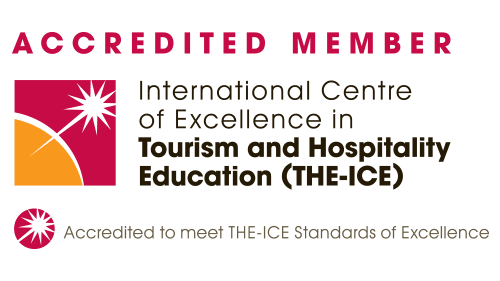Study Hospitality & Tourism Management: The Ultimate Guide (2024)
If you’re a world traveler who’s also organized, business-minded, hard-working, and a friendly people-person, read on to discover why a hospitality and tourism management program could be the perfect fit for you!
- Tourism & Hospitality
- Subject Guides

SCHOLARSHIPS | STUDENT RESOURCES | MORE SUBJECT GUIDES
Are you constantly daydreaming about your next big adventure, checking flight prices to faraway destinations, and planning fun itineraries for you and your travel buddies? A hospitality and tourism program might be right up your alley!
While you love lounging on the beach at a resort in Bali, you’re curious about the business behind the scenes. What drives travelers to pick their destination, what makes an incredible experience, and what impact do tourism and travel have on local communities?
Studying tourism and hospitality management is your ticket to one of the highest growing industries today: According to the UN World Tourism Organization (UNWTO), tourism has experienced continued growth and diversification to become one of the fastest growing economic sectors in the world!
The World Travel & Tourism Council (WTTC) estimates that 1 of every 10 jobs on the planet are in the hospitality and tourism industry, which also accounts for 1 in 5 of all new jobs created over the last five years. That means there’s plenty of opportunities to create a career in this ever-growing industry.
If you’re a world traveler who’s also organized, business-minded, hard-working, and a friendly people-person, read on to discover why a hospitality and tourism management program could be the perfect fit for you!
In this guide:
- What is a hospitality and tourism degree?
- How long does a degree take?
- Why study hospitality and tourism abroad?
- What's the difference between Hospitality and Tourism
- Tips for choosing a tourism and hospitality degree
- Advice from graduates
- What to ask universities about their hospitality programs
- What to look for in a university
- Hospitality and tourism accreditations for universities
- Careers in hospitality and tourism
- Salaries in the hospitality and tourism sector
- Popular universities for studying hospitality and tourism
Find a Hospitality & Tourism program
Use our free search engine to find & compare hospitality and tourism degrees from top universities around the world.
What is a hospitality and tourism degree?

There is a wide range of program options to choose from. Certificate programs focusing on one area of study are more suited for professionals seeking to upskill, while broader undergraduate or graduate level programs provide students with an in-depth look at all areas of the industry.
Hospitality and tourism degrees can specialize in one area of the industry, like sustainable tourism development, or cover a wide range of topics. These can include courses in management, accounting, sales and marketing, business administration, product design, intercultural communication, and much more!
Many programs provide students the opportunity to travel abroad to gain hands-on experience and training in the industry through an internship. Students of hospitality or tourism will often study a modern language in conjunction with their degree to better equip themselves for an international career.
How long does it take to get a hospitality and tourism management degree?
While certificates in tourism or hospitality can be completed in as little as two weeks, studying at a bachelor’s level usually takes three or four years. At a master’s level, studies will last one or two years.
At a bachelor’s level students will be introduced to the travel and leisure industry, learning basics in business administration and hospitality and tourism studies and important underlying theories. In the second or third year, students will often take their studies abroad to gain important practical knowledge in the industry. Degrees may conclude with a bachelor’s level project or thesis.
A master’s degree in hospitality and tourism is usually focused on a single track like sustainability, policy making, or administration and management. These degree plans are often research-based and conclude with a master’s thesis.
Why study hospitality and tourism abroad?
If you have thought of using your love for travel and helping others to succeed in a Hospitality Management program, then maybe you have already considered expanding your horizons to include degree programs abroad.
Why are so many students around the world packing their bags to study hospitality management abroad?
1. Start a new adventure
When you study a program in your own country, the content typically focuses on the business side of hospitality management. But, why not challenge yourself and take your passions abroad and set your sights on a brand new set of skills?
By studying abroad, you introduce yourself to a whole new way of life. You will get the chance to experience a new city, a new culture, and most likely a new language. Naturally, such a big change can come with challenges. But, by overcoming them, you learn the skills necessary to excel in your new program before you even hit the books.
2. Make yourself marketable
According to a broad industry survey, major employers selected what they considered to be the best hospitality and tourism management schools in the world to recruit new talent. Of the top ten schools, seven different countries are represented, including Switzerland, the Netherlands, and the United Arab Emirates.
By selecting a school abroad, you cultivate a global network of contacts and increase your fluency in cross-cultural communication. You also demonstrate to future employers that you are an innovate individual who is ready to take on a challenge and use the skills you’ve learned to excel in a dynamic, fast-paced workplace.
3. Take your education further
Graduate degrees in hospitality and tourism management are also increasing in popularity as industry trends in international, tech, and eco-tourism demand that professionals in the industry stay educated and relevant in order to keep grabbing tourists’ attention.
If you missed the opportunity to study abroad during your undergraduate program, here’s your chance to live the study abroad experience. What better way to get a whole new perspective on life than to introduce yourself to a whole new culture.
What's the difference between Hospitality and Tourism?
The hospitality and tourism career cluster is focused on management, marketing, and operations of restaurants and food services, lodging, attractions, recreation events, and travel related services. While jobs in this career cluster can overlap both sectors, there are some differences between hospitality and tourism that can affect your career outlook.
What is hospitality?
Hospitality includes all jobs related to customer service and travel industries, such as hotel management, food sanitation and preparation, and human resources. A high level of customer service is often required for a position as a manager of a five star resort or conference center.
What is tourism?
Tourism is an industry that revolves around travel, with a special focus on how to make travelers feel comfortable and taken care of. If you work in the tourism industry, you may work for a travel company or as travel agents and tour guides.
While the differences between hospitality and tourism are slight, it’s important to consider which career path interests you the most before deciding on a program. Most programs will combine both subjects and many include an internship or work experience so you’ll have first-hand knowledge of the industry before you graduate.
Tips for choosing a tourism and hospitality degree
When deciding which hospitality and tourism management program to pursue, you should try to answer the following questions:
How much time can I devote to a program?
Do I need to travel or relocate to study a program?
How much can I afford to spend on a program?
What skills do I hope to gain from a program?
What kind of certification or degree do I want to receive?
These questions will help you decide whether to opt for an online course from the comfort of your home, a certification in a specific area or topic of interest, or a longer undergraduate or graduate program at a university.
The program you choose will depend on your level - are you looking for an entry-level position or do you hope to advance to a managerial position? You can check job ads that sound interesting to you and search for programs that meet the job requirements.
Helpful advice from hospitality and tourism management graduates
We talked with some graduate students who had recently completed their programs in hospitality and tourism or are currently undertaking it to see what they thought about their program and if they have any advice to share with you.

"Since it was a 4-year degree, there were many subjects. I was able to touch all branches of this huge industry and to choose the one that fits the most with my personality and professional objectives."
- Irati Icardo, Bachelor’s degree in Tourism from Universidad de Deusto

“I learned state-of-the-art concepts, obtained outstanding practical skills and truly enjoyed learning from a broad scope of cultural and ideological diversity. I am furthering the career path for my future by developing my skills at Walt Disney World.”
- Masayuki Kokubun, ACP International Tourism & Hotel Management and Optional Practical Training (OPT) at Walt Disney World Resort

"People who study tourism should definitely choose a study program where they can learn at least one different language. I think it is also very important to do an internship in the field such as working for an airline, a safari company or a cruise ship. The program should be international and of course, offer the opportunity for an Erasmus semester in order to meet great people.''
- Marisa Meschkat, International Tourism Industry Management at NHTV University in Breda
What questions should you ask a university to find the right hospitality and tourism management program?
We also asked the same students above if there were any questions they asked or wished they had asked during the research and application process to determine which program was right for them. Here were the most common and helpful questions they think you should be asking universities before you apply.
Is the program specialized in certain areas of the tourism industry?
Are there opportunities to take part in an academic exchange program?
Are there any language courses offered?
What should I look for in a university for studying hospitality and tourism management?

If you’re interested in studying tourism or hospitality at a university level, the best programs combine theory with practice. Independent and classroom study should be combined with practical projects like group work to design your own travel event or marketing campaign.
Get experience abroad
A hospitality and tourism management degree should prepare students for a career in the travel industry so experience in the field is key. Many programs include a mandatory study abroad component that may be combined with an internship to give students experience working in a tourism or hospitality company abroad.
Learn another language
It’s also important to choose a university program with a mandatory language component if you are not multilingual. Being able to converse across language barriers is a huge benefit in an international field like hospitality and tourism.
Take advantage of the available resources
Finally, look for a program that has outstanding resources and facilities. Many programs end in a research project, so a well-equipped library and study space is important. Also consider the staff—do they have experience in the field? This can provide you with the best connections to jump start your career in the hospitality and tourism management industry!
Types of hospitality and tourism accreditation
Now that you’ve narrowed down your list of schools or programs based on the above criteria, it’s important to verify that the school is accredited.
Accreditation is the process of confirming that an institution of higher education meets the strictest educational standards. Accrediting bodies are private, nongovernmental organizations who share the goal of evaluating schools and programs to make sure they meet the highest quality standards.
The benefits of choosing an accredited school are many. Accreditation ensures the highest quality of education, makes it easier to determine the value of college credits, allows students to apply for federal loans or grants, is considered by potential employers, and pushes schools to continually improve. Besides national or regional accreditation, students interested in the tourism industry should look for the following accreditation:

UNWTO TedQual Certification
The UNWTO TedQual Certification is a voluntary accreditation offered by the World Tourism Organization of the UN (UNWTO). Its objective is to improve the quality of the tourism education, training, and research programs. The evaluation criteria measure the efficiency of a school’s academic system alongside its incorporation of the tourism industry and students’ needs within the program.

THE-ICE Standards of Excellence
Another accreditation to look out for is THE-ICE Standards of Excellence, which accredits tourism, hospitality, events, and culinary arts institutions. This accreditation focuses on areas like administration, courses and curriculum, teaching and learning, resources and facilities, and much more to recognize and assure institutional excellence.
Careers in Hospitality and Tourism
As one of the world’s largest industries with a global economic contribution of over 7.6 trillion U.S. dollars in 2016, the travel and tourism industry is a great field to pursue a career in. Last year, travel and tourism comprised 1/10 of all jobs (330 million)! The hospitality and tourism industry is diverse, but here are some potential hospitality and tourism jobs:
- Travel consultant
- Product manager for a travel company
- Marketing Manager
- Hotel/Resort Manager
- Sustainable Tourism Expert
- Event Planner
- Guest Relations Manager
- Executive Chef
What are tourism and hospitality management salaries?
The salary you can expect from a career in hospitality and tourism can vary based on the job title and responsibilities. Since there are such a wide variety of options to choose from, we’ve broken it down into some popular career choices:

Travel agent
Regardless of the client’s reason for travel, be it work, vacation, or family, a travel consultant much ensure that every detail is taken care of and that the trip goes smoothly.
Entry level: $36,297
Mid-career: $39,243
Experienced: $41,158

Hotel manager
Hotel or resort managers are responsible for overseeing day-to-day operations, budgeting, ensuring quality of service, hiring and training new staff, and maintaining a high level of customer service.
Entry level: $44,862
Mid-career: $47,767
Experienced: $61,888

Executive chef
If your goal is to become an executive chef at a restaurant, you will manage all food and beverage operations, oversee the back of house labor and budgets, and develop menus, special dishes, and supervise food production. This is a career to aspire to, so salaries reflect a high level of experience.
Experienced: $60,436
Late-career: $64,626

Event planner
Business in the hospitality industry often have their own event planner who is responsible for organizing and facilitating special events, large gatherings, and functions.
Entry-level: $42,504
Mid-career: $52,725
Experienced: $56,134
Popular universities to study hospitality and tourism management
Tio University of Applied Sciences
Location: Utrecht, Netherlands
Courses available in: Business Management, Hotel and Event Management, and International Tourism Management
CETT School of Tourism, Hospitality and GASTRONOMY
Location: Barcelona, Spain
Courses available in: Event Management, Hotel Management, and Tourism Management
University College Birmingham (UCB)
Location: Birmingham, UK
Courses available in: Hospitality Management, Culinary Arts, Event Management, and Tourism Management
Sustainability Management School (SUMAS)
Location: Gland, Switzerland
Courses available in: Hospitality Management, Sustainable Tourism, and Sustainable Hospitality
Find more hospitality & tourism programs
Use our free search engine to find & compare hospitality and tourism degrees from top universities around the world.

Author
The Keystone Team is comprised of experienced educators and advisors dedicated to providing valuable resources and advice to students all over the world.
Read related articles
